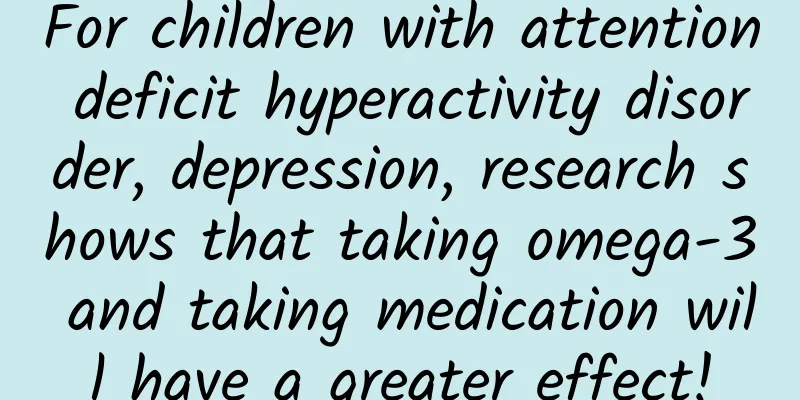For children with attention deficit hyperactivity disorder, depression, research shows that taking omega-3 and taking medication will have a greater effect!

|
To fight against COVID-19, recent studies have found that Omega-3 fatty acids have the function of enhancing the innate immune system, and therefore may indirectly reduce the damage caused by COVID-19 to the body. In addition, a recently published "Omega-3 Clinical Guidelines" also pointed out that for children with attention deficit hyperactivity disorder, autism or depression, in addition to drug treatment, it also plays an auxiliary role, and even clearly explains the dosage, time, evaluation, and even side effects. "Clinical Guidelines for Omega-3 Fatty Acids in Child and Adolescent Psychiatric Disorders" summarizes the results of all clinical trials on the effectiveness of omega-3 fatty acids in attention deficit hyperactivity disorder, autism, and depression in children and adolescents According to internationally renowned nutritional psychiatry experts Dr. Chang Bei-chen and Professor Su Guan-bin, who have been collaborating with international clinical teams for many years, they recently accepted the invitation of the well-known international journal "Clinical Psychoneuropharmacology and Neuroscience" to review the conclusions of all clinical trials on Omega-3 fatty acids in children and adolescents with mental illness, and then formulated and published "Clinical Guidelines for Omega-3 Fatty Acids in Children and Adolescents with Mental Disorders". This latest paper integrates all the results of clinical trials on the effectiveness of Omega-3 fatty acids in attention deficit hyperactivity disorder, autism and depression in children and adolescents. Study finds insufficient intake of omega-3 fatty acids linked to delayed cognitive development in children after birth Zhang Beizhen, director of the Department of Child and Adolescent Psychiatry at the China Medical University Hospital, said that very few children and adolescents with mental illness actually receive professional treatment. The reasons are nothing more than the public's negative impression of seeing a psychiatrist, and they are worried that a record will be left and that the children will need to take long-term medication. Early intervention and prevention can reduce the socioeconomic burden of mental illness among children and adolescents. There is also much evidence to support that early nutritional intervention can protect the brain neurodevelopment of children and adolescents with mental illness. For example, studies on insufficient omega-3 fatty acids during pregnancy have found that insufficient intake of omega-3 fatty acids is associated with delayed cognitive development in children after birth. Even children’s inflammation index or omega-3 index in the body will be important indicators for evaluating children’s response to omega-3 fatty acid treatment in the future. The Mind-Body Interface Research Center of the China Medical University Hospital is dedicated to studying the role of nutrition in the prevention and treatment of mind-body diseases, and exploring the mechanisms of omega-3 fatty acids with immune regulation and neuroprotection. In recent years, it has conducted in-depth research on the role of omega-3 fatty acids in childhood and adolescent mental illnesses (such as attention deficit hyperactivity disorder, autism, and childhood and adolescent depression). Director Professor Su Guanbin said that mental illness is a complex disease, and the health insurance system makes the treatment method focus on drug therapy, which often fails to provide patients with satisfactory treatment results; in addition, the need to add warnings to the instructions for use of drugs also increases the difficulty of treating such patients. This paper clearly explains the dosage, time, evaluation, and even side effects used for individual diseases, which can provide great assistance to clinicians. “Currently, countries around the world are moving towards integrated mind-body treatments. Taiwan is limited by its health insurance system and health regulations, so many innovative treatments can only be carried out in experiments,” Professor Su said earnestly. Professor Su is an internationally renowned expert in nutritional psychiatry and vice president of Tainan Municipal Annan Hospital. He emphasized that "although everyone knows that it is important to supplement children with nutrients such as Omega-3 fatty acids, there has never been any relevant clinical guidance, resulting in most physicians not knowing how to use Omega-3 fatty acid supplements to assist clinical treatment." This latest paper integrates all the results of clinical trials on the effectiveness of Omega-3 fatty acids in attention deficit hyperactivity disorder, autism, and childhood and adolescent depression, and summarizes specific clinical use guidelines. It clearly explains the dosage, time, evaluation, and even side effects used for individual diseases, so it can provide great assistance to clinical physicians. Director Zhang suggested that children with attention deficit hyperactivity disorder, autism and depression who want to take omega-3 fatty acids should first discuss with the child's psychiatrist. If the current medication response is good, it is recommended to continue using the medication and combine it with omega-3 fatty acid treatment. In addition to accelerating the improvement of symptoms, it can also enhance the treatment effect, which is more effective than taking omega-3 alone. It is recommended to take it regularly for 12 to 24 weeks. Recommended dosage of omega-3 fatty acids: 1. Attention deficit hyperactivity disorder: DHA+EPA ≥ 750 mg/day. 2. Dosage for autism: DHA+EPA 1300-1500mg/day. 3. Dosage for depression in children and adolescents: DHA+EPA 1000-2000 mg/day (EPA accounts for a larger proportion). |
Recommend
Why do I bleed again just a few days after my period? Here is the answer
If this happens between two periods and the amoun...
How much does menopause surgery cost?
Menopause troubles the health of many female frie...
What causes pain in adnexitis?
The cause of adnexitis pain may be related to bac...
What are the causes of uterine fibroids and what are the symptoms of uterine fibroids?
Uterine fibroids are a common gynecological disea...
How much do you know about the cause of uterine adnexitis?
Among the categories of adnexitis, uterine adnexi...
Why did my menstruation stop when my uterine fibroids got bigger? Will my menstruation stop coming when my uterine fibroids get bigger?
Why did my menstruation stop when my uterine fibr...
Does curing ectopic pregnancy have any impact on future fertility?
Once an ectopic pregnancy is confirmed, the pregn...
What items can be used to screen for cervical precancerous lesions?
Correctly understanding the examination methods f...
Analyze the causes of several adnexitis that need attention
Adnexitis is a gynecological inflammation that is...
Prevent cervical erosion and protect women's health
Cervical erosion is terrible for female friends, ...
Will adenomyosis disappear after menopause?
Symptoms of adenomyosis usually improve after men...
Will menopause occur at 50?
Will menopause occur at 50? People usually enter ...
What are the symptoms of recurrent pelvic effusion?
Physiological pelvic effusion and pathological pe...
Clinical manifestations of dysmenorrhea in adolescent girls
What are the clinical manifestations of dysmenorr...
Be aware of the symptoms of ovarian cysts
The symptoms of many gynecological diseases are v...









